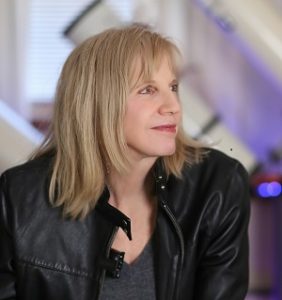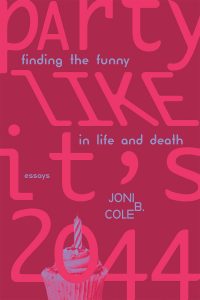Joni B. Cole on Writing and Excerpt from Party Like It’s 2044
Joni’s writing process
 As a longtime writing teacher, I know all sorts of ways to help writers get unstuck, whether its offering them deadlines, writing prompts, feedback, or instruction on narrative craft. But when I got stuck working on some of the essays in Party Like It’s 2044, I would always return to one bit of advice offered by my ninety-two-year old friend, Herb.
As a longtime writing teacher, I know all sorts of ways to help writers get unstuck, whether its offering them deadlines, writing prompts, feedback, or instruction on narrative craft. But when I got stuck working on some of the essays in Party Like It’s 2044, I would always return to one bit of advice offered by my ninety-two-year old friend, Herb.
“Focus on the funny,” Herb insisted.
He was right, of course, because finding the funny is what always brings me back to writing, even if I don’t stay there for long.
As a “serious” writer, it’s all the more important to allow myself to start by having fun on the page. I need to let loose with my voice and trust that if some personal experience or idea amuses me, I might as well write about it and see where it leads.
By focusing on the funny (whether it’s funny ha ha or funny peculiar), it helps me accomplish a rough first draft (always the toughest draft for me). It also forestalls those questions that can be debilitating if I worry about them too early in the creative process. Questions like: But what is the point of the essay? What is my theme? Why should readers care about my personal stories?
Don’t get me wrong. Those questions matter to me. I want Party Like It’s 2044 to make readers laugh and think. I want my work to encourage people to reflect on their own lives and open their hearts and perspectives. But achieving those lofty literary goals are why God invented revision, I remind myself. And—given the challenges of creation—I think it makes sense that both She and I could use a good laugh.
[Excerpted essay from Party Like It’s 2044]
Save the Date
by Joni B. Cole
Dennis Rodman did it, so why can’t I? The admittedly eccentric basketball player married himself, arriving for the ceremony in a horse-drawn carriage, wearing a custom French wedding dress, and attended by a wedding party of women in tuxedos. Dennis Rodman’s self-marriage might have been a publicity stunt to sell his new book (Note to self—would that work for me?!), but for several years I, too, have seriously toyed with this notion of sologamy. Though that word—which I hear as slog-amy—makes it sound like a lot of work, and if that’s what it’s like being married to me, well, my ex-husband probably wouldn’t argue.
And yet.
I love weddings. Mine and everyone else’s, which takes me by surprise. My own wedding some thirty years ago was a slapdash fifteen-person affair set at a colonial tavern in Paradise, Pennsylvania in Amish Country, just a few miles down the road from towns called Blue Ball, Bird-in-Hand, and Intercourse. Having grown up near these communities, not to mention the fact I am an adult, these town names shouldn’t make me titter, but, seriously, look at their tourist brochures: Worship at the Blue Ball Mennonite Church… Fun Things to do in Intercourse!
When I jumped into married, it was three weeks tops from my engagement to my wedding, one week of that time spent apart from my soon-to-be-husband because he was in graduate school halfway across the country. The January rain on my wedding day was bad for my permed hair, but a sign of good luck because, according to superstition, if it’s raining when you “tie the knot,” your marriage is harder to unravel.
The particulars of my “big day” were no fuss—we arranged for a ceremony set at a pretty, historical inn, performed by a chaplain borrowed from a local hospital. I had never been that person who planned her wedding since childhood. I prefer practical to romantic, maybe to a fault? For both of us, the long-distance nature of our relationship—should we split up or commit? —was getting old. The wedding would force-stop our indecisiveness, or, as my wise mother told me when I asked her advice, “Either shit or get off the pot.”
That mentality might have been what motivated the marriage, but the wedding itself transcended practicality, or even romance, in ways I never could have anticipated. I know some people see the formality of getting married as simply a piece of paper, and I might have been one of them, until I felt the power of the act. In the ritual of exchanging vows, in the promise to have and to hold, I had what can only be described as a spiritual experience, a term I don’t use lightly because when other people start tossing it around, I tend to look for the exits.
Even now, decades later and divorced, memories of my wedding ceremony take me to that sacred space. Even when I attend other people’s weddings, the everyday world recedes, as I witness the exchange of vows. During those moments, there is no room for statistics, like the fact that 45 percent of marriages end in divorce. It doesn’t matter that two weeks earlier the bride and maid of honor got into a fight over shoe dye. Who cares if the relationship started with an affair? Marriage is not just a piece of paper. It sanctifies commitment, love, even grace.
I have floated this idea of marrying myself by my two daughters, some friends, even my boyfriend.
“It’s a real thing,” I reassure them. “You can read about it in Brides magazine, and people talk about it on mindfulness podcasts.”
“Are you serious?” they ask, and I understand their confusion. For one thing, I’m not the type of person who gravitates toward this kind of behavior, meaning the kind of behavior that could land you a guest spot in that third hour of the Today Show, in that segment called: “Older women who-still-do adorable-slash-outlandish things.” Yet, the concept of making a commitment to yourself continues to intrigue me, especially given how so many people, myself included, spend an inordinate amount of time live-tweeting their faults and inadequacies between their own ears.
Usually I am a decisive person, the opposite of a vacillator. I want this…I hate that. I’m going…I’m not going, and you can’t make me. For me, even a rash decision is far more palatable than the experience of uncertainty and the drag of emotional energy left in its wake. On this subject of self-marriage, however, I have been toying with this idea for at least three peak wedding seasons. Do it… Don’t be silly… Do it… What could be the downside?
—
[To read more of this essay, and other essays on finding the funny in life and death, check out Joni B. Cole’s new release, Party Like It’s 2044, available wherever books are sold.]
PARTY LIKE IT’S 2044
 Author Joni B. Cole worries that Vlad the Impaler may be a distant cousin. She feuds with a dead medium. She thinks (or overthinks) about insulting birthday cards, power trips, and the real reasons writers hate Amazon. And she wishes, really wishes, all those well-meaning people would stop talking about Guatemala. At once irreverent and thought provoking, Cole offers a joy ride through this collection of eclectic essays that lands smack on the sweet spot between soul searching and social commentary, between humor and heft.
Author Joni B. Cole worries that Vlad the Impaler may be a distant cousin. She feuds with a dead medium. She thinks (or overthinks) about insulting birthday cards, power trips, and the real reasons writers hate Amazon. And she wishes, really wishes, all those well-meaning people would stop talking about Guatemala. At once irreverent and thought provoking, Cole offers a joy ride through this collection of eclectic essays that lands smack on the sweet spot between soul searching and social commentary, between humor and heft.
Early Reviews
“Here is a voice giving us a welcome break: vibrant, provocative, funny and flavorful—Cole’s self-ironic, audacious wit both cheers and consoles. Showing a delicate compassion for her subjects and ‘toastees’ while never letting herself off the hook, Cole’s deep and generous thinking makes room and fresh air: worth breathing deeply.”—Joan Frank, author of Late Work
“Fabulously readable and thoroughly engaging, it is Cole’s voice that makes her stories sing. Whether she’s leading us into laughter, or holding our hand through dazzling moments of emotional recognition, Cole takes writing seriously while taking herself lightly, and thereby illuminating the world with these brief, memorable essays.”—Gina Barreca, author of They Used to Call Me Snow White, but I Drifted
BUY HERE
Bio:
JONI B. COLE is a writing instructor and author of seven books, including the acclaimed new essay collection Party Like It’s 2044, described by scholar and humorist Gina Barreca as, “Fabulously readable and thoroughly engaging.” Joni also has authored two books for writers: Good Naked: How to Write More, Write Better, and Be Happier (listed as one of the “Best Books for Writers,” Poets & Writers magazine); and Toxic Feedback: Helping Writers Survive and Thrive (“strongly recommended,” Library Journal). For twenty-five years, Joni has taught online and in-person creative writing to adults through her own Writer’s Center in White River Junction, Vermont, as well as at academic programs and conferences around the country. For more info: www.jonibcole.com
Category: On Writing























